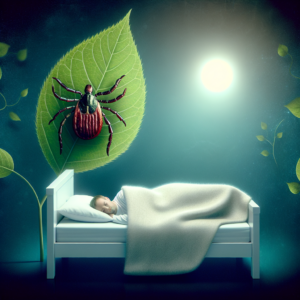Key Takeaways
-
Chronic Lyme disease can be exacerbated by stress, and managing stress is key to improving overall health.
-
Deep breathing exercises can help release tension from the body and relax the nervous system.
-
Incorporating anti-inflammatory foods into your diet supports your body’s healing process.
-
Establishing a consistent sleep routine is crucial for recovery from chronic Lyme disease.
-
Seeking emotional and psychological support through therapy and support networks can improve mental well-being.

Unlocking the Link Between Stress and Chronic Lyme Disease
When we talk about chronic Lyme disease, we often focus on the physical symptoms. But there’s another layer to this condition that’s just as important: the impact of stress. Stress doesn’t just make you feel anxious; it can also exacerbate the symptoms of Lyme disease. Understanding this connection is a critical step towards empowering your healing journey.
Understanding Chronic Lyme Disease
Chronic Lyme disease is a complex condition that can affect multiple systems in the body, leading to a range of symptoms from fatigue and joint pain to cognitive difficulties. It’s caused by the bacterium Borrelia burgdorferi, transmitted through a tick bite. But the battle doesn’t end with the infection; for many, it’s a prolonged fight against lingering symptoms.
One of the challenges with chronic Lyme is that it’s often misunderstood. People with this condition may look fine on the outside, while inside, they’re dealing with significant health issues. It’s a battle that requires not just medical intervention but also lifestyle changes, especially in the way we handle stress.
Identifying Stress as a Culprit
Stress can be sneaky and it is not defined by feelings only. It affects our bodies in ways we might not even notice, tightening muscles and ramping up inflammation. For someone with chronic Lyme, this can mean a worsening of symptoms. That’s because stress impacts the immune system, and a robust immune response is critical in fighting Lyme disease.
Therefore, managing stress isn’t just about feeling better mentally; it’s about creating an environment in the body where healing can happen more effectively. Let’s dive into how we can manage stress and support our bodies in the fight against chronic Lyme disease.
Stress Management Techniques
Now, let’s talk about how to reduce stress. This isn’t about a one-size-fits-all solution; it’s about finding what works for you and incorporating it into your daily life.
Deep Breathing Exercises
Deep breathing is a simple yet powerful tool. It signals to your body that it’s time to relax, activating the parasympathetic nervous system, which is responsible for the ‘rest and digest’ state. Here’s a straightforward breathing exercise you can do anywhere:
-
Find a comfortable seated position.
-
Close your eyes and take a deep breath in through your nose, filling your lungs completely.
-
Hold your breath for a count of four.
-
Exhale slowly through your mouth, letting all the air out of your lungs.
-
Repeat this cycle for a few minutes, focusing on the sensation of breathing.
This exercise can help release tension from the diaphragm and relax your entire nervous system, which is especially beneficial for those with chronic Lyme disease.
Prayerful Meditation
Prayerful meditation is another technique that can help manage stress. It involves paying attention to focussing on God instead of the stuff you are worried about. It also puts you in the “here and now” rather than where your worries are which are either in the past or future. By focusing on the here and now, you can break the cycle of worry and stress that often accompanies chronic illness.
To practice prayerful meditaion, find a quiet space, sit comfortably, and focus on gently repeating the name of God. When I do this it is called the Jesus Prayer. When your mind wanders, gently bring your attention back to the Name. This activates the relaxation response while at the same time having a lot of spiritual benefit.
Physical Activity for Stress Relief
Physical activity is a fantastic stress reliever. It releases endorphins, which are natural mood lifters. Exercise can also help take your mind off worries, allowing you to find a sense of calm and focus.
For those with chronic Lyme, it’s important to choose gentle activities that do not exacerbate symptoms. Options like walking, stretching, or swimming can be beneficial. Always listen to your body as you start any new exercise regimen.
Nutrition plays a pivotal role in managing chronic Lyme disease. An anti-inflammatory diet can support the body’s healing process by reducing inflammation, which is often a significant part of chronic Lyme symptoms.
Anti-inflammatory Foods
Let’s focus on foods that are known for their anti-inflammatory properties. These include:
-
Leafy greens like spinach and kale
-
Fatty fish rich in omega-3 fatty acids, such as salmon and sardines
-
Berries, such as blueberries and strawberries
-
Nuts like almonds and walnuts
-
Olive oil, a staple in the Mediterranean diet
-
Flax seed and Chia seed, the richest sources of the essential omega-3, ALA.
Integrating these foods into your daily meals can help reduce inflammation and support your body’s immune system.
Probiotics and Gut Health
A healthy gut is essential for a healthy immune system, which is critical when battling chronic Lyme disease. Probiotics can help balance the gut microbiome, which in turn can improve digestion and reduce inflammation. Foods rich in probiotics include yogurt, kefir, sauerkraut, and other fermented foods. A daily dose of probiotics, whether through diet or supplements, can make a significant difference in how you feel.
The Role of Sleep in Managing Chronic Lyme
Good quality sleep is crucial for healing. When you’re dealing with chronic Lyme, your body needs all the rest it can get to fight the infection and repair itself. Let’s talk about how you can improve your sleep.
First, recognize that sleep disorders, particularly insomnia, are commonly associated with Lyme disease. It’s not just about getting enough hours of sleep, but also about the quality of that sleep.
Creating a sleep-conducive environment is essential. This means a dark, quiet, and cool bedroom. Avoid screens before bedtime, as the blue light can interfere with your natural sleep-wake cycle.
Establishing a Sleep Routine
Consistency is key when it comes to sleep. Try to go to bed and wake up at the same time every day, even on weekends. A bedtime routine can signal to your body that it’s time to wind down. This could include reading a book, taking a warm bath, or practicing relaxation exercises.
Natural Sleep Aids and Supplements
Sometimes, despite your best efforts, sleep can still be elusive. Natural sleep aids like melatonin or valerian root may help. Magnesium is another supplement that can improve sleep quality and also has the added benefit of reducing muscle aches and pains. As always, consult with your healthcare provider before starting any new supplements.
Herbal Remedies for Lyme and Stress
Herbs can be powerful allies in managing both Lyme disease and stress. They’ve been used for centuries to support health and well-being. Let’s explore some herbal remedies that might be beneficial.
Adaptogens: Nature’s Stress Relievers
Adaptogens are a class of herbs that help the body cope with stress. They work by balancing the adrenal system, which is responsible for managing the body’s hormonal response to stress. Some well-known adaptogens include:
-
Ashwagandha, which can help reduce anxiety and improve sleep
-
Rhodiola, which can increase energy and stamina
-
Holy basil, also known as tulsi, which can lower cortisol levels and promote relaxation
-
Panex Gensing, which can also help with sleep.
Integrating adaptogens into your daily routine can help your body manage the stress that comes with chronic Lyme.
Herbs Specifically Beneficial for Lyme Disease
Some herbs have been found to have specific benefits for Lyme disease. These include:
-
Cat’s claw, which may have immune-enhancing and anti-inflammatory properties
-
Japanese knotweed, which is rich in resveratrol and can help with cognitive function
-
Garlic, which has natural antimicrobial properties
It’s important to remember that herbs can interact with medications and other supplements, so it’s essential to talk with a healthcare provider knowledgeable about Lyme disease before starting any herbal regimen.
Emotional and Psychological Support
Battling chronic Lyme can be an isolating experience, but you don’t have to go it alone. Emotional and psychological support is a critical component of your healing journey.
Building a Support Network
A strong support network can provide encouragement and understanding. This could include friends and family, as well as support groups, either in person or online. Sharing experiences with others who understand what you’re going through can be incredibly validating and empowering.
The Power of Routine and Structure
Finally, establishing a routine can provide a sense of control and normalcy. When your life feels upended by illness, having structure can help you focus on what you can do each day to support your healing.
Creating a Healing Environment at Home
Your home should be a sanctuary that supports your healing. This means creating a space that is calm, comfortable, and conducive to rest. Surround yourself with things that bring you joy and relaxation, whether that’s plants, soothing colors, or comfortable furniture.
Remember, healing from chronic Lyme is a journey, and managing stress is a vital part of that journey. By incorporating these strategies into your life, you’re taking powerful steps towards reclaiming your health and well-being.
Organizing Your Day for Success
Structure can be a lifeline when you’re managing chronic Lyme disease. Organizing your day helps you prioritize your health and ensures you’re giving your body what it needs. Start by setting aside specific times for rest, meals, and any treatment or therapy you’re undergoing. Remember, every small step you take is a part of your larger journey to wellness.
When to Seek Professional Help
If you’ve been trying to manage your stress and Lyme disease symptoms on your own but aren’t seeing improvement, it might be time to seek professional help. Healthcare professionals who are knowledgeable about chronic Lyme can offer guidance tailored to your situation.
They can help you fine-tune your stress management techniques, adjust your treatment plan, and provide support for the psychological aspects of dealing with a chronic illness. Don’t hesitate to reach out—getting professional help can be a turning point in your healing process.
Recognizing the Signs of Chronic Stress Overload
Chronic stress can sneak up on you, and it’s crucial to recognize the signs before it overwhelms your system. Symptoms of chronic stress overload include persistent anxiety, insomnia, fatigue, irritability, and difficulty concentrating. If you notice these signs, it’s a signal that your current stress management strategies might need a revamp.
Listen to your body and be honest about how you’re feeling. Chronic stress isn’t just unpleasant; it can impede your recovery from Lyme disease by affecting your immune system and overall health.
Most importantly, acknowledging that you’re experiencing chronic stress is not a sign of weakness. It’s the first step toward making positive changes that will support your health and well-being.
Finding a Lyme-Literate Health Professional
Not all healthcare providers are familiar with chronic Lyme disease, so it’s important to find one who is. A Lyme-literate health professional will understand the nuances of the disease and be up-to-date on the latest treatments and research.
You can find a Lyme-literate doctor through patient advocacy groups, online forums, or by asking for referrals from local support groups. These professionals often take a holistic approach to treatment, which can be particularly beneficial when managing both Lyme disease and chronic stress.
Once you find a provider, be prepared to share your full medical history and current symptoms. This information will help them create a comprehensive treatment plan that addresses both your Lyme disease and your stress levels.
Frequently Asked Questions (FAQ)
Here are some common questions about the connection between stress and chronic Lyme disease, along with straightforward answers to help you understand this complex relationship.
What is the connection between stress and Chronic Lyme Disease?
Stress can weaken the immune system, making it harder for your body to fight off infections like Lyme disease. Additionally, stress can exacerbate Lyme symptoms and contribute to chronic inflammation. Managing stress is therefore an essential part of treating chronic Lyme disease. In fact the majority of the natural Lyme disease treatment program I use with my patients is focussed on Stress reduction.
Stress can also affect your body’s ability to absorb nutrients and can lead to unhealthy coping mechanisms, which can further impact your health. By managing stress, you’re supporting your body’s natural healing processes.
Can stress management actually improve Lyme disease symptoms?
Yes, stress management can improve Lyme disease symptoms. When you reduce stress, you help calm the body’s inflammatory response, which can alleviate symptoms like joint pain and fatigue. Stress management can also improve your sleep quality and cognitive function, which are often affected by Lyme disease.
What are some simple stress-reduction techniques I can start today?
There are many stress-reduction techniques you can start implementing right away. Here are a few:
-
Take short breaks throughout the day to practice deep breathing.
-
Set aside time each day for a relaxing activity you enjoy, like reading or gardening. I call these “mini vacations”.
-
Incorporate gentle exercise into your routine, such as walking or stretching.
These simple practices can have a profound impact on your stress levels and overall health.
How does nutrition affect Chronic Lyme Disease?
Nutrition plays a significant role in managing chronic Lyme disease. An anti-inflammatory diet can help reduce the body’s inflammatory response, which is often triggered by Lyme disease. This includes eating plenty of fruits, vegetables, lean proteins, and healthy fats while avoiding processed foods and sugars. I also suggest gluten free for my patients which means cutting out the grains.
What should I do if my stress levels are not decreasing?
If your stress levels aren’t decreasing despite your efforts, it’s important to seek additional support. This could mean consulting with a healthcare professional, joining a support group, or exploring other stress management techniques like biofeedback or professional counseling. Remember, managing stress is a crucial part of your treatment for chronic Lyme disease, and it’s okay to ask for help.
By understanding the connection between stress and chronic Lyme disease and implementing these strategies, you can empower your body’s healing process and improve your quality of life. Remember, you’re not alone on this journey, and there are resources and support available to help you manage both your stress and your health.
Managing stress and tension to heal gut and brain from chronic Lyme
Aug 8, 2019 — Shona Curley offers guidance on how to notice and release tensions…
The Impact of Lyme Disease on Mental Health: Understanding …
Jul 17, 2023 — Suicide: The chronic pain and the emotional toll of Lyme disease …
Chronic Symptoms and Lyme disease
Jan 12, 2024 — Strategies developed to help patients manage prolonged symptoms r…


Leave a Reply